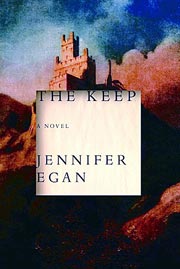Sunday, November 19, 2006
Meta- yet gripping.
Jennifer Egan, The Keep (Alfred A. Knopf, 2006).

At the start, Jennifer Egan's novel is the story of Danny, a New Yorker in need of a fresh start and trying to find it in Central Europe, where his cousin Howie is renovating a castle into a hotel. Where in Central Europe is unclear:
Even so, you're sympathizing with Danny, and then all of a sudden the curtain has dropped to the floor and the narrator is talking directly to you:
Before too long, Egan's novel is running on parallel tracks, with Danny's story progressing alongside that of a prison writing class. Off course, both stories manage to both head in similar directions and intersect. To say more would be unfair, so I won't.
I don't usually care for these sort of meta-fiction tricks, but Egan pulls it off because I never stopped caring about her characters. Even as Danny's plight is revealed to be a tale within a tale -- doubly fictive -- and even when his experiences verged on the allegorical, I kept suspending my disbelief. Even as she reminds you that she's telling a story, she tells a story well.
Months later -- I read The Keep in August -- Egan's work seems less of an accomplishment than it did when I put it down, but I think that's only because the next book I picked was Thomas Pynchon's Mason & Dixon. The Keep is a terrific little work.

At the start, Jennifer Egan's novel is the story of Danny, a New Yorker in need of a fresh start and trying to find it in Central Europe, where his cousin Howie is renovating a castle into a hotel. Where in Central Europe is unclear:
Talking on the phone to his Cousin Howie, who owned this castle and had paid Danny's way to help out with the renovation, he'd tried to nail down some details.Communications failure is one of several recurring themes in The Keep, especially for poor Danny, whose struggles to reach out and touch New York are only the start of it. Howie's casual grasp of the borders -- or maybe you believe that he just bought a hotel but he doesn't know what country it's in? -- is also typical. Egan supplies just enough concrete detail to let you know that she could take it away. You never forget for long that she's there behind the curtain.
Danny: I'm still trying to get this straight--is your hotel in Austria, Germany, or the Czech Republic?
Howie: Tell you the truth, I'm not even clear on that myself. Those borders are constantly sliding around.
Danny (thinking): They are?
Howie: But remember, it's not a hotel yet. Right not it's just an old--
The line went dead. When Danny tried calling back, he couldn't get through.
Even so, you're sympathizing with Danny, and then all of a sudden the curtain has dropped to the floor and the narrator is talking directly to you:
He was heading into memory number two, I might as well tell you that straight up, because how I'm supposed to get him in and out of all these memories in a smooth way so nobody notices all the coming and going I don't know.And then it's back to the story.
Before too long, Egan's novel is running on parallel tracks, with Danny's story progressing alongside that of a prison writing class. Off course, both stories manage to both head in similar directions and intersect. To say more would be unfair, so I won't.
I don't usually care for these sort of meta-fiction tricks, but Egan pulls it off because I never stopped caring about her characters. Even as Danny's plight is revealed to be a tale within a tale -- doubly fictive -- and even when his experiences verged on the allegorical, I kept suspending my disbelief. Even as she reminds you that she's telling a story, she tells a story well.
Months later -- I read The Keep in August -- Egan's work seems less of an accomplishment than it did when I put it down, but I think that's only because the next book I picked was Thomas Pynchon's Mason & Dixon. The Keep is a terrific little work.